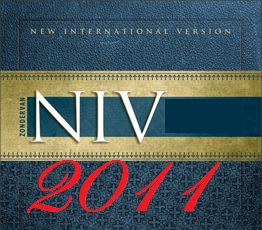Bible, Control, and Culture- Bible Mistranslation, New 2011 NIV, and the Interchange Between Language and Religion

- 2011 NIV Bible - BibleGateway.com
Read the new 2011 NIV online now, for free, before it comes out in print.
Bible, Control, Culture: Bible Mistranslation
“…if anybody is preaching to you a gospel other than what you accepted, let him be eternally condemned!” So reads Galatians 1:9. At least according to the New International Version (NIV) of the New Testament as it was between 1973 and 2010. The verse sounds a bit different in the new 2011 NIV revision: “…if anybody is preaching to you a gospel other than what you accepted, let them be under God's curse!” (emphases mine)
In the original letter to the Galatian church, the words I emphasized above were as follows: “ἀνάθεμα ἔστω.” Yes, the original “book” of Galatians, like the rest of the New Testament, was written in Greek. “ἀνάθεμα ἔστω”, when translated, says, “Let him/her be cursed”. Unlike the 2011 NIV, it says nothing of “God’s curse”
Now it seems to me that there is a great difference in meaning between saying “let him be eternally condemned” (1973 & 1984 NIV) and “let him be cursed”. For one thing, the concept of eternity is absent from the correct translation. Secondly, while it is (presumably) impossible for any human to “eternally” condemn someone, it is altogether possible for a human to put a curse on someone. People do it all the time. Whether such curses can actually harm the individual cursed is a matter for another discussion.
I am truly glad to see the new 2011 NIV revise a verse which, for some thirty-seven years, has been so grossly mistranslated as to warrant the label: “overtly deceptive”. The new version is still a bit deceptive, in my opinion, but far less so. But I hope that this quick analysis of a single verse of scripture will illustrate a couple of things. First, people do not necessarily translate a text to say literally what the original words said, but rather, they often translate according to what they believe the original words meant. Second, what the original words of scripture actually say and what a person believes them to mean are two very different things.
You can give this article a Facebook "Like" at its Facebook page: here. This opens in a new window so you can keep reading this article.
Religious Establishments Influence Translation
What a person believes concerning any given words in scripture is heavily influenced by what a person believes at large. And what a person believes at large, if that person is a religious person, is considerably shaped by whatever religious establishment/sect that person is most influenced by. For example, let’s say that I am a scholar working on a new translation of the Bible. If I believe that God condemns a great number of people to an eternity of torment, I might look at a verse like Galatians 1:9, and reason something like this: “I wonder what it means by ‘let him be cursed’. Surely God does not allow someone who is cursed into the kingdom of heaven, and I believe in only one fate besides going to heaven. Thus, if someone is ‘cursed’ they will surely be eternally condemned!”
If, however, I do not believe that God is the sort who would allow any creature to experience terrible suffering for a literal eternity, then I will not be inclined in the least to reason my way to a translation that reads “eternally condemned.” Instead, I will translate the words to say simply what they say in the Greek, ‘let him be cursed’.
If I am a religious person, then whether or not I believe that God condemns people to eternal torment will correlate strongly with what is believed by most of the people within my religion or religious sub-group. If I consider myself a “Baptist”, then I will be very likely to believe in eternal torment, and thus I might easily get the meaning of ‘eternal condemnation’ from the passage in Galatians. If I consider myself a “Christian Universalist”, however, I will not believe in eternal torment, and so I will not read that concept into the Galatians passage.
Translations Influence Religious Establishments
It gravely concerns me when I see a Bible mistranslation like the one in the NIV (but not in the new 2011 NIV), which said “eternally condemned’ in Galatians 1:9. After all, the NIV is the bestselling Bible in the English language. What’s more, the error continued to appear in this Bible for thirty-seven years. What this means is that many, many people have read that passage in its mistranslated form. Their thoughts and opinions have been influenced, if ever so slightly, by it.
For example, if a Baptist got into a discussion with a Christian Universalist over whether or not God condemned anyone to eternal torment, the Baptist could say, “Hey! Wait a minute!” He could then pull out his non-2011 NIV Bible and turn to Galatians 1:9, and point at the words, ‘let him be eternally condemned’. He would then ask the Universalist to defend her disbelief in eternal hell in the face of a scripture which clearly seemed to indicate the concept. The Baptist would ask the Universalist if she believed the Bible or not. Being a Christian, the Universalist would reply that she does believe the Bible. “In that case,” the Baptist might say, “you must believe in eternal punishment. The Bible talks about it right here.” And if the Universalist didn’t know any Greek, she would then be left with great difficulty in defending her beliefs, and the Baptist would remain forever unconvinced.
A Two-Way Interchange
So it turns out that there is an interchange between language and
religious establishments, by which I mean there is a two-way
relationship. We’ve seen how one’s religious beliefs can change the
meaning one obtains from different words. And we’ve seen that one may
translate a text for others to read based, not on the text’s literal
meaning, but on the meaning they filter from it based on their beliefs.
And since one’s religious beliefs may be influenced by the religious
group/establishment to which he belongs, that establishment, by
influencing his beliefs, also influences whatever translation he will
create and publish. So religious establishments influence the very words
in religious texts.
We’ve also seen how a particular wording in an English translation can
influence whether or not someone succeeds at persuading someone of a
different religious opinion over to their own religious opinion (as the
Universalist couldn’t persuade the Baptist due to the mistranslation in
Galatians). This means that the number of people in the Universalist
church is now one less than it might have been. So in this way the wording of the translation
impacts a religious establishment (the Universalist church).

- Why I Don't Believe That Hell is Eternal
Under close examination, it seems that the Bible does not teach that hell literally lasts forever.

Control
Language and translation can enable a religious establishment to exert greater control over large groups of people. Language can do this both by helping the religion to draw in more converts and by then enabling the religion to enforce conformity of thought/opinion among its adherents. Conformity can be towards specific teachings or towards the religious establishment itself. In the Galatians passage as it was in the old NIV, for example, the translation “eternally condemned” encourages Bible believers to conform to belief in the specific teaching of “eternal punishment”. This translation, however, also doubles to encourage conformity to the religious establishment as well, as it can create a terrifying threat in the minds of anyone who would question their sect’s established doctrines. After all, it seems to impose a sentence of eternal punishment on anyone who dares to preach a “different gospel”. But what constitutes a “different gospel”, fearful Christians might ask themselves. A religious denomination can easily act as if anything that contradicts its myriad particular doctrines (such as “original sin” or “the trinity” or “eternal punishment”) would qualify as presenting a “different gospel”. Thus, to question the opinions and entrenched beliefs of the religious sect on almost any point that they consider important now might seem to have a terrifying threat of grievous and eternal consequences attached to it.
Such control is not always consciously intended by translators or religious leaders, and when it is consciously intended, it may not be with the ill-intent of exercising power for the sake of power alone. Such power plays may seem justified, or even seem to be acts of goodness in God’s service, if the individuals making such maneuvers perceive themselves to be saving people from dreadful eternal consequences. And so the misreading of a verse like Galatians 1:9 performs three tasks at once: 1. Encouraging conformity to a specific doctrine (eternal punishment) 2. Encouraging conformity to the religious sect which alone teaches the narrowly defined “true gospel” and 3. Allowing those who perpetuate such power dynamics to feel supremely right in doing so; they read the verse itself as suggesting that they are, by terrifying their adherents away from any possible error, saving souls from “eternal condemnation”.

If you're enjoying my writing in this article, please take a moment to look at some of my short poems: click here. This opens in a new window, so you won't lose the article you're currently reading.

- Greek Bible Words: Meaning, Translation, and Mistranslation
A list of "Christian" words commonly found in the Bible, which did not originally have religious connotations, and often had different layers of meaning than they do now.
The Evolution and Employment of Religious Words within the Religious Establishment
Mistranslation and selective translation based on personal biases are not the only ways that language can support conformity to a religious establishment. Over time, words which originally did not have any religious connotation at all are often adopted by a religious community. The words are then used by that community so often that they come to have an almost strictly religious connotation within the society at large. Such words then lend further reinforcement to the structure of the religious system that thus infused them with their new meanings.
For example, the word “preach” in the new 2011 NIV is often a translation of the Greek word “κηρύσσω", which means “to announce publicly, to proclaim, to herald”. It referred to the public proclamations of the town-criers and heralds, who’s roles in that society were similar to the roles of news anchors and radio/TV spokespeople today: to make announcements and deliver news to the public. It was not a religious word. In our society today, however, the word “preach” has come to carry almost exclusively the religious sense of “deliver a sermon”. So this word, in its common modern usage, is quite different than its original literal usage. From the word “preach”, a religious establishment may justify the existence of a word like “preacher”, which refers to someone who makes a living delivering their own religious sermons to groups of people. Thus, the structure of the religious system is reinforced by the existence of this “office” and title: “preacher”, which is an extension of a word that originally had no religious connotation at all. The religious establishment thus adopts language and infuses its own new meanings into it, and in turn these new meanings serve to support and strengthen the structure of that same religious establishment.
Another example of this is the Greek word "εκκλησια", which the 2011 NIV (like the old NIV) translates as “church”. But "εκκλησια" was originally a political term referring to the public assembly of all eligible voters in the Athenian democratic system. In such an assembly, each person could have their say, and all of their opinions counted. In modern English, however, this word has religious meaning. If we say we are going to “church”, we mean not that we are going to a democratic sort of assembly where we will each speak up as we see fit and each contribute our opinion on important matters. We mean we are going to a place where, besides singing when we are instructed to do so, we are expected to sit in silence and listen to one person, a “preacher”, whose title and office grant him to be the only one who voices his opinion in such an assembly.
After Such Knowledge
To the concerned Bible reader who would like to avoid, to the extent possible, being manipulated by word choice in Bible translation, I have two possible suggestions. The first suggestion is to learn Greek and to buy a Greek New Testament. Since learning Greek, however, requires a considerable investment of time and energy which most people simply can not afford to make, my second suggestion is this: buy one or two “literal” translations of the Bible, and use those. I put the word “literal” in quotes because there is really no such thing as a literal translation of anything. Whenever one attempts to convey in a new language something which was originally composed in a different language, something will always be lost in meaning or nuance, and something will always be added. So translations are simply more or less literal than other translations. But my suggestion is to obtain one of the more literal translations out there, such as the Young’s Literal Translation or the Concordant Literal Translation, which both attempt to stay as close to the literal meaning of the original Greek as possible.
The Young’s Literal Translation, for example, renders as “assembly” what the 2011 NIV translates “church”. “Assembly”, I think, is much closer to the original meaning of the Greek word, devoid of the religious connotations infused into the word “church” by centuries of use by a religious establishment. And what about Galatians 1:9? The 2011 NIV, remember, still inserts an imaginary word into its translation, rendering “under God’s curse”, while the original text had no mention of “God” at all in this verse. The Young’s translation, perhaps unsure of any way to properly convey the range of meaning for “ἀνάθεμα ἔστω” (“let him be cursed”) into English, simply transliterates a word directly from Greek, saying “anathema let him be!” This leaves it to the reader to find out what “anathema” entails, which I would suggest doing by referring to a relatively unbiased Greek/English lexicon. The Strong’s Concordance is not a scholarly lexicon, proper, but rather a complete index of words as they are already translated in the King James Bible, which rather defeats the purpose of trying to circumvent religious bias in examining the Bible. I recommend the lexicon by Liddell and Scott. Someone might say that the Young’s translation is of little use if it transliterates words of which it is unsure, leaving the reader to do some of their own research. I say that if one is not willing to do a little research every now and then, one should not expect to avoid error or be well-informed. In any event, it seems far more noble and reverent to the Spirit of Truth for a translator to transliterate a word which may cause false understandings, rather than to plunge blindly ahead and translate however she sees fit, based on her own religious opinions.
Links
- 2011 New International Version (NIV Bible) - BibleGateway.com
Read the 2011 NIV online now for free, before it comes out in print. - NIV 2011 comparison with the NIV 1984 and TNIV
Very comprehensive, useful, and user-friendly - Young's Literal Translation (YLT Bible) - BibleGateway.com
Read Young's Literal Translation online - Concordant Literal Version of the Bible Online
Literal version of the Bible to read for free. - The Greek New Testament at biblegateway.com
Read the Greek New Testament online for free. - Liddell and Scott's Greek-English Lexicon
Greek-English lexicon, free online.









